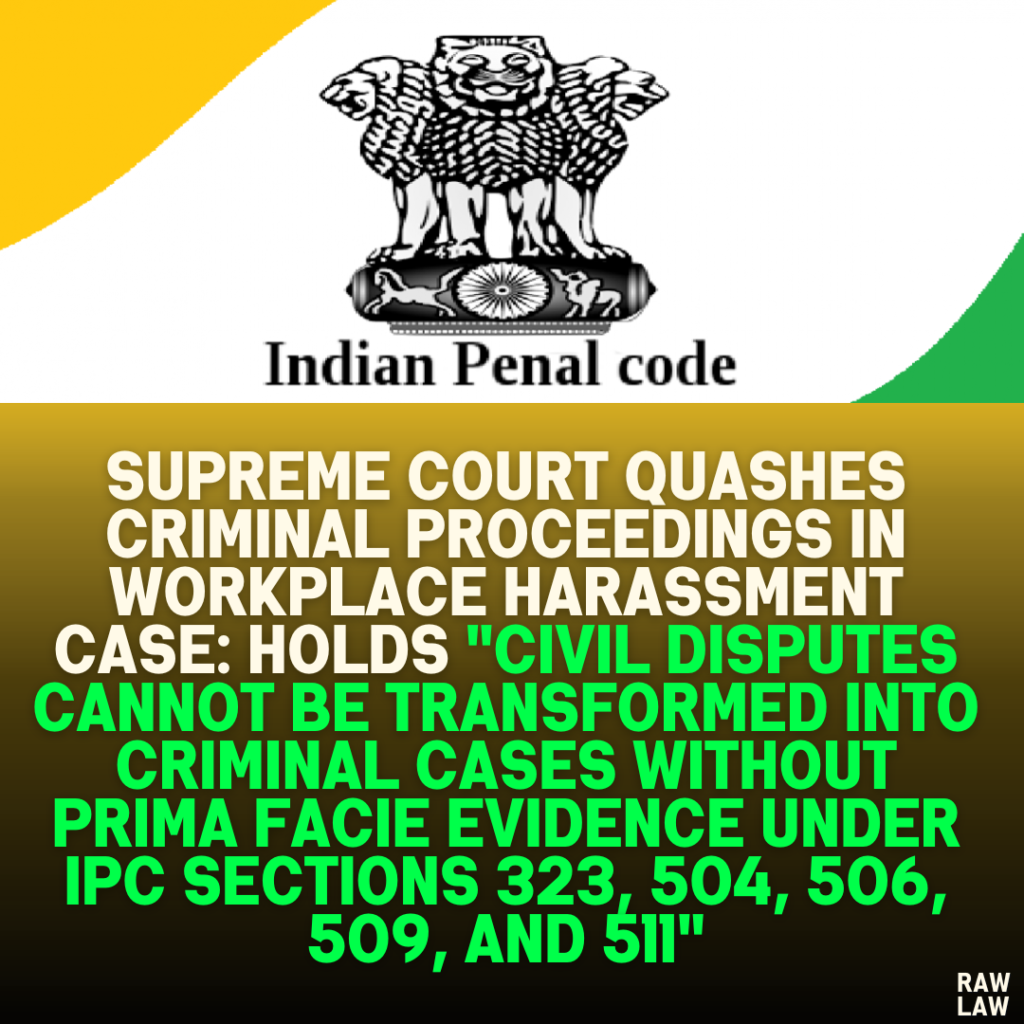Court’s Decision
The Supreme Court quashed the chargesheet and criminal proceedings against the appellants, overturning the Karnataka High Court‘s judgment. It ruled that the allegations and materials presented failed to establish prima facie elements of the offences under the Indian Penal Code (IPC) sections mentioned. Allowing the proceedings to continue, the Court noted, would be an “abuse of legal process” and a “travesty of justice.”
Facts
- The complainant was employed by a company as a Technical System Analyst.
- On October 25, 2013, the complainant alleged that she was forced to resign under threats of immediate termination by the HR Manager (one of the appellants).
- She claimed her personal belongings, including a company-issued laptop containing intellectual property (work-related codes and data), were confiscated.
- She further alleged that she was forcibly removed from the premises by security personnel, who also harassed and threatened her.
- Initially, a Non-Cognizable Report (NCR) was filed on October 26, 2013, followed by an FIR lodged two months later, accusing the appellants of committing offences under Sections 323, 504, 506, 509, and 511 of the IPC.
- A chargesheet was filed, repeating these allegations and asserting that the appellants had physically assaulted the complainant and used “filthy language.”
Issues
- Whether the allegations disclosed prima facie elements of offences under Sections 323, 504, 506, 509, and 511 of the IPC.
- Whether the chargesheet and criminal proceedings could be quashed under Section 482 of the Code of Criminal Procedure (CrPC).
Petitioner’s Arguments
The appellants (the HR Manager and another employee) argued:
- No Prima Facie Case: The FIR and chargesheet failed to disclose offences under the IPC sections alleged, even if the facts were assumed to be true.
- Civil Dispute Framed as Criminal Case: The complaint revolved around employment-related issues like termination and resignation, which are civil matters.
- Absence of Evidence: The second appellant was not present at the time of the incident, and no material evidence supported the claims of physical assault or threats.
- Inconsistent Allegations: There were contradictions in the complainant’s statements, including discrepancies between the FIR and the chargesheet.
- No Medical Examination: The complainant’s claim of physical assault was unsupported by medical evidence.
- Malicious Intent: The complainant allegedly used the criminal complaint to pressurize the appellants into settling unrelated civil disputes.
Respondent’s Arguments
The complainant and the State argued:
- Prima Facie Offences Established: The FIR and chargesheet contained sufficient allegations to proceed under the IPC sections alleged.
- Serious Harassment Alleged: The complainant was subjected to mental and physical harassment, including confiscation of her intellectual property and forced resignation.
- Physical Assault and Threats: The appellants allegedly used threats and physical force to coerce the complainant.
- Employer-Employee Dynamics: The appellants, in their capacity as senior officials of the company, abused their position of power to intimidate and harass the complainant.
Analysis of the Law
- Section 323, IPC (Voluntarily Causing Hurt):
- The Court noted that the complainant’s allegations of being forcibly removed from the premises involved security personnel, not the appellants.
- No evidence showed direct involvement by the appellants in causing bodily harm.
- Sections 504 and 509, IPC (Intentional Insult and Insult to Modesty):
- The chargesheet alleged that the appellants used “filthy language,” but no specific words or context were provided to demonstrate intentional insult or provocation.
- Insult to modesty requires actions capable of shocking the decency of a woman, which were absent here.
- Section 506, IPC (Criminal Intimidation):
- The alleged threat—forcing the complainant to resign or face immediate termination—was related to an employment dispute, not criminal intimidation.
- Section 511, IPC (Attempt to Commit Offences):
- Since none of the substantive offences were made out, Section 511 (attempt) was also inapplicable.
The Court emphasized that civil disputes should not be converted into criminal cases and cited past judgments on the misuse of criminal proceedings.
Precedent Analysis
- Fiona Shrikhande v. State of Maharashtra (2014): The Court clarified that mere insults do not constitute an offence under Section 504 unless they provoke public disorder or criminal acts.
- Rupan Deol Bajaj v. Kanwar Pal Singh Gill (1995): The Court reiterated that an act must be capable of outraging a woman’s modesty under Section 509.
The Court applied these principles to conclude that the allegations lacked the requisite ingredients of the offences.
Court’s Reasoning
- Inadequate Evidence: The complainant’s allegations were vague and unsupported by corroborative evidence, such as medical records or eyewitness testimony.
- Procedural Flaws: The delay in filing the FIR and the absence of specific allegations in the original complaint raised doubts about the complainant’s credibility.
- Civil Nature of the Dispute: The core issue was employment-related and better suited for adjudication in labor courts.
- Abuse of Process: Allowing the proceedings to continue would perpetuate harassment of the appellants, contrary to the principles of justice.
Conclusion
The Supreme Court quashed the proceedings, holding that they were based on vague, inconsistent allegations and lacked prima facie merit. It clarified that its findings would not affect the pending labor court proceedings.
Implications
This judgment highlights the importance of safeguarding individuals from frivolous criminal proceedings, especially when the allegations pertain to civil disputes. It serves as a precedent for preventing the misuse of criminal law to exert pressure in unrelated matters.



